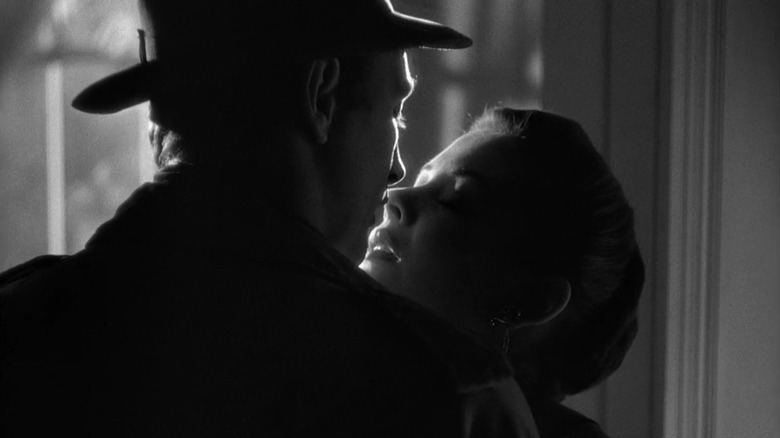
After building a reputation with a series of artful B-Movies, Jacques Tourneur was given a lavish budget by RKO to make the iconic Film Noir picture Out Of The Past (1947). Like Tourneur, cinematographer Nicholas Musuraca and production designer Albert S. D’Agostino were frequent collaborators with producer Val Lewton at RKO and had been instrumental in developing the Noir infused Gothic style of Lewton’s macabre films. As a result, Out Of The Past is a singular entry in the Film Noir canon because of the horror movie undertones of its style and its overall sensual cinematography.
The jungle in Mexico; the forests of California; the gorges around Lake Tahoe; every space oozes with sensuality and foreboding danger. The stark dynamism of German Expressionism is juxtaposed with the raw sexuality inherent to the outdoor locations of the film. Out Of The Past is, on a visual level, reiterating its narrative themes of sexualized death constantly. The dichotomy of signifiers in a single frame opens a discourse between the concepts of an inevitable fatalism and the erotic compulsion to embrace that destruction.
The sexual fetishization of death is even evident in the flashback structure of the film. The narrative is largely subjective in its existence as the memories of the protagonist Jeff Bailey (Robert Mitchum). In his mind’s eye (and the camera’s eye) the journey to his destruction is both predestined and alluring. Gratification and possession await Bailey as he, through the many plot twists and manipulations in the film, becomes complicit in bringing about his own death. Mitchum’s voice-over is a subjective reality in opposition of the image. Bailey colorfully describes a scene not as it is photographed, but how it exists subtextually for him as memory.
Out Of The Past is about a gas station attendant whose past catches up with him quite by accident and he readily accepts his fate. Out Of The Past is, at its essence, the descendent of The Killers (1946). But Out Of The Past is far more interested in the nuances of human psychology and therefore dispenses with the third party spectator of the insurance investigator. Out Of The Past takes the audience into the mind and experiences of the doomed man; embracing all of the overwhelming emotional violence of his fatalism.
The effectiveness of Tourneur’s direction of Out Of The Past has made it one of the most influential American films ever made. The snappy patter of the dialogue, the wanton cruelty of the villains (Kirk Douglas is excellent as the heavy), and the affecting visual tableaus all correlate around the film’s need to delve into the bleakest parts of a man’s psyche. Out Of The Past takes the mystery that is prerequisite to Film Noir and internalizes it; turns it into a visual complex representative of the protagonist’s psychological state.
